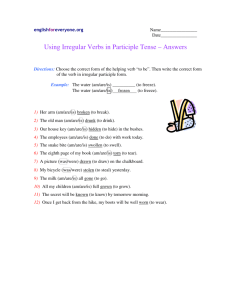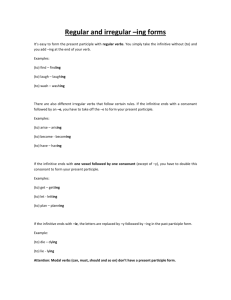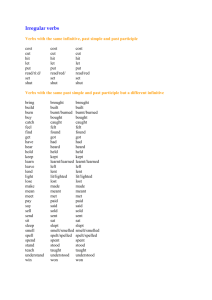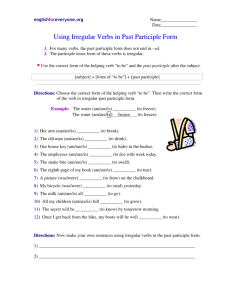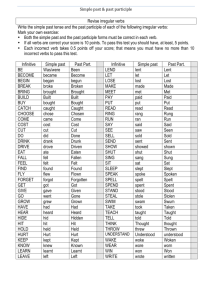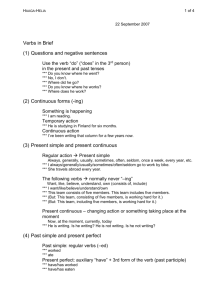Syntax 5 HO
advertisement
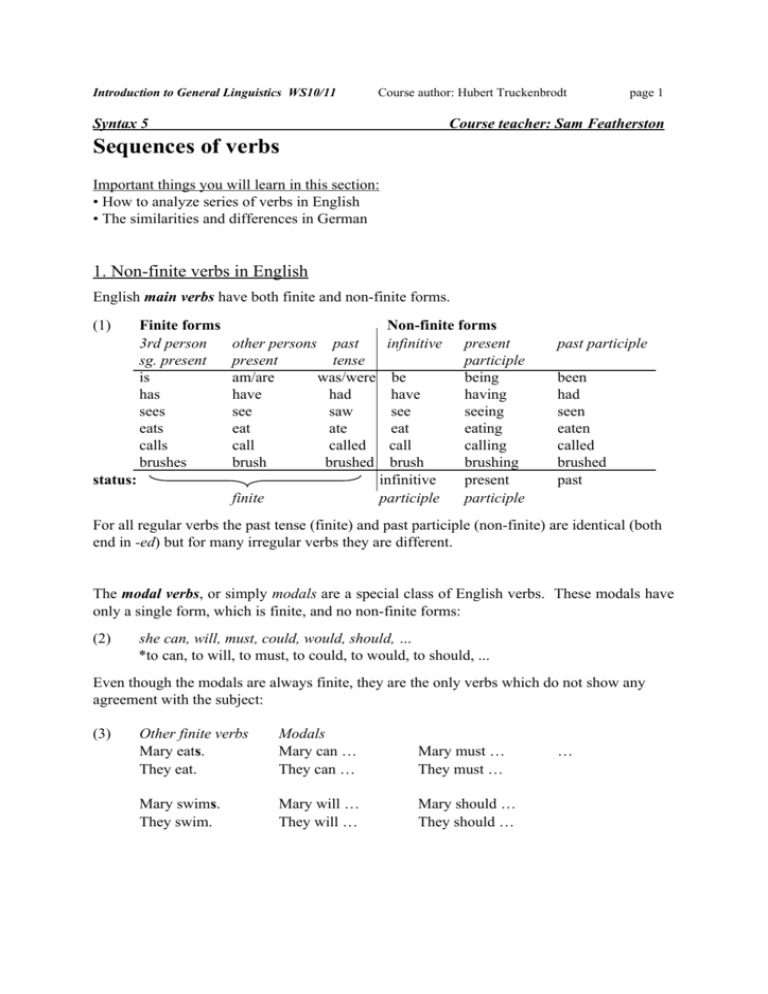
Introduction to General Linguistics WS10/11 Course author: Hubert Truckenbrodt Syntax 5 page 1 Course teacher: Sam Featherston Sequences of verbs Important things you will learn in this section: • How to analyze series of verbs in English • The similarities and differences in German 1. Non-finite verbs in English English main verbs have both finite and non-finite forms. (1) Finite forms 3rd person sg. present is has sees eats calls brushes status: Non-finite forms other persons past infinitive present present tense participle am/are was/were be being have had have having see saw see seeing eat ate eat eating call called call calling brush brushed brush brushing infinitive present finite participle participle past participle been had seen eaten called brushed past For all regular verbs the past tense (finite) and past participle (non-finite) are identical (both end in -ed) but for many irregular verbs they are different. The modal verbs, or simply modals are a special class of English verbs. These modals have only a single form, which is finite, and no non-finite forms: (2) she can, will, must, could, would, should, … *to can, to will, to must, to could, to would, to should, ... Even though the modals are always finite, they are the only verbs which do not show any agreement with the subject: (3) Other finite verbs Mary eats. They eat. Modals Mary can … They can … Mary must … They must … Mary swims. They swim. Mary will … They will … Mary should … They should … … Introduction to General Linguistics WS10/11 Course author: Hubert Truckenbrodt page 2 1.1. Verbs as complements We have seen that verbs and prepositions often require their complement DPs to be in a particular case. In German for instance, many verbs, such as sehen and schlagen, and many prepositions, such as für and um, take accusative complements while verbs like helfen and gefallen prepositions like von and zu take dative complements. Now verbs which take other verbs as their complements also select their status. Modals Modal verbs require a verb as complement and this is always in the bare infinitive form. We may say modals select the status bare infinitive in their complement. (4) modal + bare infinitive May will eat/swim/be_happy * Mary will eats/ate * Mary will eating/eaten Auxiliaries The verbs have and be can be auxiliary verbs. (They can also *not* be auxilary verbs as in I have a cat and I am a firefighter.) As auxiliaries, they also select the status of the verb that follows. The perfect auxiliary verb have requires the following verb to be a past participle. (5) perfect tense: have + past participle John has seen Mary (... attacked, shot, kicked, insulted, ....) * seeing Mary * saw Mary * see Mary The verb be has two functions as an auxiliary: first, it can function as a progressive auxiliary and combine with a present participle to form the progressive (or continuous), as in (6a); second, it can function as a passive auxiliary and combine with a past participle to form the passive - (6b). (6) a. progressive: be + present participle John is singing. * John is sang. * John is sing. b. passive: be + past participle Mary was seen (by John). * Mary was see. * Mary was saw. It is important to distinguish the status that a verb has itself, and the status that the verb selects for the next verb. For example, in John is singing, the verb is is finite and 3rd person present, but selects the status present participle for the following verb singing. Whatever form the verb be occurs in itself, if it is functioning as a progressive auxiliary, it always selects a present participle for the next verb, eg John is singing, John was singing, John has been singing, John will be singing, etc. Introduction to General Linguistics WS10/11 Course author: Hubert Truckenbrodt page 3 Non-finite forms of be behave exactly the same way. In (7), the first verb is a finite form of the auxiliary have, which selects the form of the next verb as a past participle – cf. (5). This is been, a form of be. This in turn selects the present participle form for the next verb, singing. (7) finite Mary has been singing a. have + past part. b. be + present participle So in a series of verbs, the first verb appears in a finite form, but all later verbs appear in the status selected by the one before: (8) Mary could have been modal infinitive past participle talking present participle to John. The modal selects the status of the next verb have as infinitive. The verb have, in turn, selects the status of been as past participle. Since this is a form of be, it selects the status of the next verb as present participle. (9) Mary could have been infinitive past participle talking to John. present participle modal +bare infinitive have + past participle be + present participle 2 The phrase structure of sequences of verbs Each verb projects a VP and each is the complement of the preceding verb. A verb can select the status of its complement VP just as it can select the category of a complement DP. (10) VP1 V1 VP2 V2 have been VP3 V3 seeing DP Mary We can write the selection of status into the argument structure of the lexical entry: modals and auxiliaries not only select the category (VP) of their complements, but also their status. (11) Verbal complements in argument structures could: <__, <VP[infinitive]>> have: <__, <VP[past participle]>> be: <__, <VP[present participle]>> be: <__, <VP[past participle]>> (likewise for other modals) perfect progressive (or continuous) passive Introduction to General Linguistics WS10/11 Course author: Hubert Truckenbrodt page 4 These lexical features interact with phrase structure rules to determine structure. Note that features such as [past participle]are shared between head (V2) and phrasal projection (VP2). (12) have + VP[past participle] VP1 V1 VP2[past p.] | have V2[past p.] DP... | see-n lex.entry: have <__, <VP[past participle]>> Even a modifier often adjoined to the left of the VP 2, and thus coming between VP1 and VP2, creates no problem with selection, since we assume that the two VP2 nodes share features. (13) Intervening adjuncts VP1 V1 | have VP2[past p.] The two nodes VP2 created by adjunction must also share features. AdvP VP2[past p.] | Adv V2[past p.] DP ... | | often see-n 2 Non-finite verbs in German German is similar, but with different affixes and some different auxiliary verbs (14) Morphology of the non-finite verb in German a. (bare) infinitive: -en; les-en, schreib-en b. present participle: -end (= -d added to infinitive): les-end, schreib-end c. past participle circumfix ge-__-en/-t; ge-les-en, ge-leg-t sometimes with infixation of first part: auf-weck-en, auf-ge-weck-t. sometimes without the first part of the prefix: er-arbeit-en, er-arbeit-et sometimes with a change in the stem: geh-en, ge-gang-en. Introduction to General Linguistics WS10/11 Course author: Hubert Truckenbrodt page 5 (15) Choice of the non-finite verb in German (core cases) a. haben/sein + past participle gelesen haben, gegangen sein b. werden + passive participle entführt werden c. similar variety of verbs with bare infinitive: modal + bare infinitive lesen müssen (16) Main differences from English, apart from the word order a. German verbal passive uses werden ("become"), English passive uses be. gefragt werden; to be asked b. But stative passive: sein + past participle gefragt sein c. German perfect tense uses haben 'have' or sein 'be', English uses only have: gearbeitet haben to have worked gerannt sein to have run d. Present participle form not selected by verbs in German; used with nouns only: ein les-end-er Fahrgast */?? lesend sein a reading passenger to be reading e. German do + infinitive is marginal & colloquial [G. umgangssprachlich] Ich tu mal was lesen. So apart from the lexical differences, just about the only major difference to the English VP structures .... ... is the order of head V and complement: (17) Simple English VP VP V Complement Simple German VP VP Complement V Whether the complement of a V is a DP or another VP makes no difference. (18) English ... VP1 V1 VP2 | have V2 DP | bought books German ... VP1 VP2 DP Bücher V1 | haben V2 | gekauft Introduction to General Linguistics WS10/11 Course author: Hubert Truckenbrodt page 6 The V1 selects the status of its verbal complement in exactly the same way, but to the left. (19) VP1 VP2[past p.] DP das Stück V1 | V2[past p.] haben | ge-seh-en NB: leftward selection: past participle + haben (but we still write haben + past participle) The German system of VPs is the same as the English, they stack. But because German VPs are head-final, they stack from the back. The systems of VPs in German and English are therefore still mirror images of each other: on the vertical axis they are identical, but on the horizontal axis they are opposites. Introduction to General Linguistics WS10/11 Course author: Hubert Truckenbrodt page 7 Draw trees for (but not the bits in brackets): 1. (I should) have eaten it. 2. (I will) be dreaming. 3. (Mary might) be photographed. 4. (Jack may) have been drinking tea 5. (Kim must) have been delayed. 6. (Jane could) be being examined. 7. (I saw two police officers holding that man's arms, but he can’t) have been being arrested, (because both he and the police were smiling.) And now in German...... 8. (Der Geist hat) verschwinden können. The spirit has disappear been.able.to 'The spirit was able to disappear' 9. (Mephisto muss) Martha verflucht haben. Mephisto must Martha cursed have 'Mephisto must have cursed Martha.' 10. (Wagner ist) streng geprüft worden. Wagner is strictly tested been 'Wagner has been tested strictly.' 11. (Gretchen muss) sofort gerettet worden sein. Gretchen must immediately saved been be 'Gretchen must have been saved immediately.' 12. (Martha wird) das Paar beobachtet haben Martha will the pair observed have 'Martha will have observed the couple.' 13. (Heinrich hätte) sie heiraten wollen sollen. Heinrich have her marry want should 'Heinrich should have wanted to marry her.' 14. (Gretchen wird) bald in dem Himmel ankommen Gretchen will soon in the heaven arrive 'Gretchen will soon arrive in heaven.' Introduction to General Linguistics WS10/11 Course author: Hubert Truckenbrodt page 8 Some trees from the exercises of Syntax 4: talk slowly vs langsam reden VP VP | V | talk VP AP | A | slowly AP | A | langsam VP | V | reden fly to the moon vs zum Mond hinfliegen VP V | fly VP PP P | to PP DP the moon P | zu DP dem Mond fly to the moon in a dream vs im Traum zum Mond fliegen VP VP V | fly PP PP V | hinfliegen VP PP in a dream VP im Traum to the moon PP V | fliegen zum Mond the students keen on syntax vs die von der Syntax begeisterten Studenten DP DP D | the NP NP | N | students D | die AP A | keen PP on the syntax NP AP NP | PP A N | | von der Syntax begeisterten Studenten envy the firmly employed workers vs die fest angestellten Arbeiter beneiden VP VP V | envy DP D | the DP NP AP1 AP2 firmly NP | AP1 N | employed workers D | die NP AP1 AP fest V | beneiden NP | AP1 N | angestellten Arbeiter

